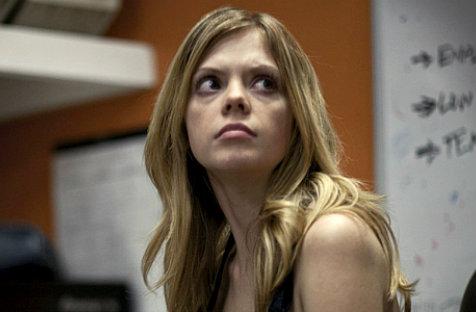Few films can claim to be as uncomfortable, unpleasant and infuriating as Craig Zobel’s second feature, nor would they want to be. Even within the most extreme examples of the horror genre, the audience’s ability to watch without constantly yelling at the screen is undoubtedly considered; in Compliance, an immediate and expressive reaction is not only likely but almost encouraged, and certainly warranted.
In his follow up to 2007’s Great World of Sound, writer/director Zobel is purposeful in his provocation, enticing viewers to consider the enormity of his scenario. The grounding of the film’s narrative in fact – as the ‘based on a true story’ label warns – augments the emotional response, inspiring several lines of inquiry: ‘how did that happen?’, ‘why would someone behave that way?’ and ‘what would I do?’
Such questions continue throughout the film’s 90 tense, terrifying minutes, heighted by every unseemly action and obedient interaction on screen. Their source is an encounter between Ohio fast food worker Becky (Dreama Walker, TV’s Don’t Trust the B—– in Apartment 23) and her manager Sandra (Ann Dowd, Bachelorette), at the insistence of a local policeman, as relayed in a lengthy phone call.
During an already stressful shift, Officer Daniels (Pat Healy, The Innkeepers) informs Sandra that Becky has been accused of stealing from a customer. He is otherwise occupied, asking her to detain and interrogate Becky in his absence. Dutifully, she complies; he remains on the phone to talk her through the process. As his instructions become more personally intrusive and physically invasive, Sandra’s limits are tested; so too, are the bounds of acquiescence to authority and the employer-employee relationship.
Sensitive to the power and horror of this disturbing scenario, which echoes the famous findings of Stanley Milgram’s behavioural studies in the 1960s, Zobel is respectful and restrained in his recreation of an event that occurred at 70 restaurants in 30 US states over a 14 year period. Remaining cool and clinical in his observational, objective approach courtesy of close framing and controlled camera movement, he elicits shock and anger by calmly, credibly depicting reality, taking care to avoid exaggerating details or sensationalising their presentation.
The central trio amplify the feature’s authenticity, inhabiting their parts to unsettling perfection. The difficulty of demonstrating three complex perspectives – perpetrator, unwitting accomplice and victim – cannot be underestimated, nor can the delicate balancing act – within each multifaceted performance and in tandem – that cements the believability of their portrayals. While it is Dowd who emerges as the film’s most accomplished player, the efforts of her co-stars cannot easily be dismissed. Whether invoking ire, incredulity or empathy, all three challenge perceptions and incite a strong reaction; as a whole, Compliance is similarly exasperating and thought-provoking.
Rating: 3 ½ stars out of 5
Compliance
Director: Craig Zobel
USA, 2012, 90 min
In cinemas January 17
Distributor: Vendetta
Rated M
Actors:
Director:
Format:
Country:
Release:





